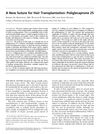 January 2018 in “Stem cells in clinical applications”
January 2018 in “Stem cells in clinical applications” Exosomes show promise for tissue repair and regeneration with advantages over traditional cell therapies.
 26 citations,
January 1994 in “Clinics in Dermatology”
26 citations,
January 1994 in “Clinics in Dermatology” Artificial skin is improving wound healing and shows potential for treating different types of wounds.
 January 2020 in “Der Pharmacia Lettre”
January 2020 in “Der Pharmacia Lettre” Nanoparticle-based herbal remedies could be promising for treating hair loss with fewer side effects and lower cost, but more research is needed.
January 2020 in “Indian Journal of Pharmaceutical Sciences” Natural products show promise for new hair loss treatments.
 81 citations,
June 2010 in “Journal of Dermatological Treatment”
81 citations,
June 2010 in “Journal of Dermatological Treatment” The document concludes that minoxidil and finasteride are proven for hair growth, herbal remedies show promise, but more research is needed to confirm their effectiveness.
50 citations,
November 2015 in “Journal of pharmacological sciences” α-mangostin nanoparticles improved acne with minimal irritation.
 September 2019 in “Journal of Investigative Dermatology”
September 2019 in “Journal of Investigative Dermatology” Sandalore®, a synthetic scent, reduced hair loss and improved hair growth in women with telogen effluvium.
1 citations,
June 1942 in “JAMA” Middle-aged men are usually either bald or gray, not both.
 February 2020 in “Our Dermatology Online”
February 2020 in “Our Dermatology Online” A synthetic drug and a South American herb may help treat alopecia areata in Chinese men.
 2 citations,
January 2001 in “Dermatologic Surgery”
2 citations,
January 2001 in “Dermatologic Surgery” Poliglecaprone 25 is better than steel staples for hair transplant surgery, causing less discomfort and finer scars.
 5 citations,
March 2000 in “PubMed”
5 citations,
March 2000 in “PubMed” The study found that using polyamide synthetic hair for implants is generally safe and gives good results with proper medical follow-up.
 5 citations,
January 2006 in “Indian Journal of Dermatology, Venereology and Leprology”
5 citations,
January 2006 in “Indian Journal of Dermatology, Venereology and Leprology” Synthetic hairs are not recommended for use.
October 2024 in “International Journal of Pharmaceutics” The finasteride patch effectively treats hair loss by enhancing skin absorption.
 4 citations,
August 2023 in “Materials”
4 citations,
August 2023 in “Materials” New synthetic polymers help improve skin wound healing and can be enhanced by adding natural materials and medicines.
 11 citations,
March 2019 in “Journal of Medicinal Chemistry”
11 citations,
March 2019 in “Journal of Medicinal Chemistry” Some synthetic carbohydrate receptors, especially compounds 3 and 15, show strong potential for treating Zika virus.
 October 2023 in “Journal of Cosmetic Dermatology”
October 2023 in “Journal of Cosmetic Dermatology” A synthetic octapeptide may help promote hair growth and counteract hair loss.
21 citations,
March 2018 in “American Journal Of Pathology” Mutations in NIPAL4 cause skin issues by disrupting lipid layers, but some improvement is seen with topical treatment.

The document concludes that scientists created various steroids with different properties, including a more effective semi-synthetic vitamin D.

Finasteride treats hair loss and prostate issues by lowering certain hormone levels.
 99 citations,
August 2009 in “Nature Genetics”
99 citations,
August 2009 in “Nature Genetics” Removing both Atr and Trp53 genes in adult mice causes severe tissue damage and death due to DNA damage.
20 citations,
September 1983 in “Archives of dermatology” The new synthetic retinoid RO 13-6298 effectively treated severe psoriasis at low doses with manageable side effects.
 1 citations,
September 2019 in “Journal of Investigative Dermatology”
1 citations,
September 2019 in “Journal of Investigative Dermatology” The research showed that CRISPR/Cas9 can fix mutations causing a skin disease in stem cells, which then improved skin grafts in mice, but more work on safety and efficiency is needed.
 May 2023 in “Asian journal of research in pharmaceutical sciences”
May 2023 in “Asian journal of research in pharmaceutical sciences” Ketoconazole is effective for treating various fungal infections and has new uses in dermatology, but oral use can have serious side effects.
9 citations,
June 2023 in “Cells” Certain natural and synthetic compounds may help treat inflammatory skin diseases by targeting a specific signaling pathway.
 14 citations,
November 2014 in “European journal of medicinal chemistry”
14 citations,
November 2014 in “European journal of medicinal chemistry” Researchers found new potential treatments for conditions related to the androgen receptor, like male hormonal contraception, by testing thousands of compounds.
 December 2020 in “International journal of research in ayurveda and pharmacy”
December 2020 in “International journal of research in ayurveda and pharmacy” Eating well and avoiding synthetic hair products are key for healthy hair.
 April 2019 in “Journal of Investigative Dermatology”
April 2019 in “Journal of Investigative Dermatology” Researchers fixed gene mutations causing a skin disease in stem cells, which then improved skin grafts in mice.
 January 2024 in “International Journal of Cosmetic Science”
January 2024 in “International Journal of Cosmetic Science” A new method using 1,4-n-butylene dimaleate effectively repairs and strengthens damaged hair.
 January 2022 in “International journal of pharmaceutical sciences review and research”
January 2022 in “International journal of pharmaceutical sciences review and research” Herbal cosmetics are becoming more popular because they are safer, have fewer side effects, and offer health benefits.
 January 1988 in “Inpharma (Balgowlah)”
January 1988 in “Inpharma (Balgowlah)” New retinoids are effective for various skin conditions and are being developed to have fewer side effects.























